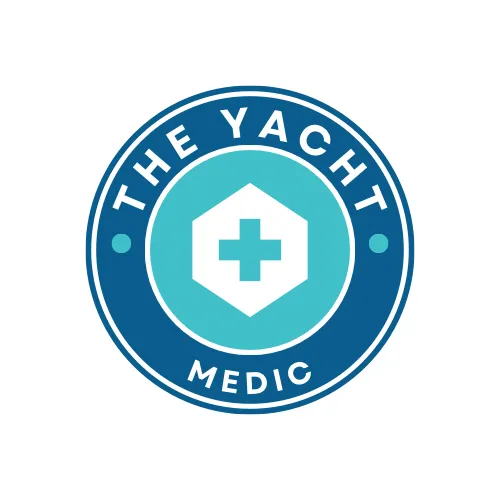See Our Latest Blogs
Beyond Boundaries, Beyond Rescue
Mastering Self Reliance At Sea

Does Yachting Cause High Blood Pressure?
I have never seen so many high blood pressures as I have this year!
I even extended the “normal limits” for Blood Pressure (BP) in my medical training classes.
At one stage I thought I would have to send half the class to their GP, I’d be left with no students
It’s pretty normal to see 190/100 in our world.
If you eat well, work out & even “meditate” why is your BP so high?
To put it bluntly, stress is quietly raising your blood pressure and impacting your overall health.
High blood pressure can lead to serious issues like heart disease and stroke, but the good news is that you can manage it by regulating your nervous system and lowering cortisol levels.
Here’s how it works:
When you’re stressed, your body releases cortisol, the “stress hormone.” In small doses, cortisol helps you handle immediate challenges.
But when stress becomes chronic, cortisol stays elevated, keeping your nervous system in a constant state of high alert. This leads to persistently high blood pressure, which is a serious risk for your heart.
Signs of high blood pressure you should never ignore:
- Persistent Headaches
- Fatigue and Tiredness
- Chest Pain or Discomfort
- Shortness of Breath
- Blurred Vision
- Frequent Nosebleeds
- Pounding in Your Chest, Neck, or Ears
So, how do we tackle this? By regulating cortisol and calming your nervous system.
I believe a lot of stess is being caused by artificial light, Wi-Fi and being surgically attached to a device at all times.
This has to stop.
Here’s how:
1. Morning Sunlight NAKED Without Sunglasses
Or ear phones / buds:
Start your day with 10-15 minutes of sunlight & exposure—without sunglasses. And SILENCE, appreciate the sounds of the environment & breathe.
This simple habit helps regulate your circadian rhythm, lower cortisol, and keep your blood pressure in check.
2. Unplug at Night: Turn off Wi-Fi and keep your phone out of the bedroom. EMFs disrupt your sleep, keeping cortisol levels high.
A tech-free, blackout room helps your nervous system reset, leading to better sleep and lower blood pressure.
3. Limit Screen Time: More screen time equals more stress.
Try a digital detox each day, even just for 2 hours, to give your nervous system a break and lower your blood pressure.
Try and stop screen time 2 - 3 hours before bed- this is a BIG ONE (necessary for melatonin production)
4. Declutter Your Mind
A clean, clutter-free environment helps reduce stress and calm your nervous system. It’s the same with your mind. Write down all the things that stress you each night, get it out if your head!
Close the note book and sleep better, knowing you left your worries on a piece of paper for tomorrow!
5. Soak Up Sunlight During the Day:
Open the blinds and let the sunlight in. Natural light helps regulate cortisol and keeps your nervous system balanced, which in turn helps lower your blood pressure. Take you sunglasses off for a while and let the real light soak in.
Bottom line:
Stress doesn’t just make you feel bad—it can seriously impact your health. By focusing on ways to regulate cortisol and calm your nervous system, you can protect your heart and live a healthier, longer life.
For more info on stess reduction, resilience, psychological safety and risk management, join the Adventure Ready program, it’s designed to get you through the last bit of the season.
Ok, message me or check link in bio!
Stay Cool!
Stay Safe
Sail Safely with Expert Medical Training
Resilience & Psychological First Aid For Yachts

Resilience First Aid (RFA) is a proactive approach to mental health, designed to equip yacht crew with the skills to prevent burnout, manage stress, and strengthen mental resilience.
Psychological First Aid (PFA) is an
immediate, compassionate response to mental distress after a crisis,
support each other emotionally, reduce trauma impact, and promote recovery
after major incidents.
Medical First Aid & Planning for Yachts

This course is designed to equip yacht owners & crew with essential first aid skills and the knowledge to set up a well-stocked and effective medical kit. Whether you're preparing for remote cruising or need to update your onboard medical resources, this course ensures you’re ready for any medical emergency.
Yachts operate in remote locations, often far from immediate medical help.
Adventure Preparation for Remote Environments

When you venture into remote environments preparation is everything. The Adventure Ready Program equips leaders, yacht crew, expedition teams, and outdoor professionals with the medical skills, resilience training, and leadership strategies
needed to handle emergencies, adapt under pressure, and thrive in extreme environments.
Be Prepared, Stay Safe & Protect Your Crew
© The Yacht Medic - All Rights Reserved,
Photography & Media by Oli Riley Photography

info@the-yacht-medic.com
+34610120242
Palam de Mallorca, Spain
